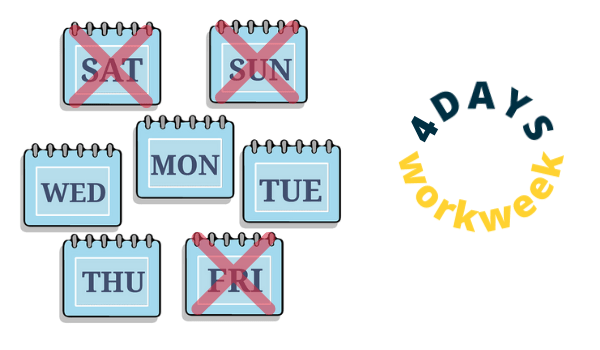4-day Work Week: Is India Ready for it?

Theme: The 4-day workweek seems a novel concept. But in a country like India wherein a number of groups are yet to just accept the 5-day week format, a four-day workweek seems like a distant dream. Even though it can result in demanding situations in implementation; however, if done nicely, it is able to result in many tremendous modifications. According to a survey performed in 2022, approximately 59% of the Indian group of workers isn’t always glad at work and has a terrible work-life balance. What Is The 4-Day Work Week? A 4-day work week is an experiment where professionals work for 4 days but with longer hours each day, totaling the same old 48 hours of working time. Under this work subculture, employees are paid for their four-day shifts and working hours from Monday to Thursday and get 3 days off per week from Friday to Sunday. The 4-day workweek lifestyle is spreading hastily across main cities like London, Canada, and the USA, as it may increase productivity even by lowering strain ranges and offering better work-life balance for employees. Companies which offer 4 days Work Week: Advocates for Youth – United States Panasonic – Japan Augury – United States Bolt Financial – United States Merit America – United States Samba Safety – United States New Leaders – United States Pros Of 4-Day Work Week : Here are three pros of a 4-day working week in an effort to make you want to replace this agenda. 1. Happier and More Satisfied Employees: Studies show that employees on a four-day workweek are less likely to go away from their job, saving money and growing loyalty. In addition, they enjoy much less pressure due to the fact they have 3 days off at some stage in the week, which makes them experience efficient enough for the rest of the week. They are greater happy with their jobs and hold a healthy lifestyle, which lets them perform better than in the event that they were running five days per week. Moreover, happier and more satisfied personnel have a tendency to supply better fine work and offer extra revolutionary ideas that help businesses grow and be extra productive. 2. Higher Productivity: If your company is struggling to stay highly productive or meet valuable business goals, such as reducing costs and increasing profits, you can straight away adopt this four-day workweek plan. Workers on this type of arrangement are typically more motivated and tend to get more done since they have an extra day off during the week to recharge and take care of personal tasks. The reduced workdays translate into increased productivity, enabling them to deliver high-quality results and complete projects faster than before. 3. Better Work-Life Balance: A 4-day work week creates a better balance between life and work by using giving workers 3 days off in the course of the week in which they are able to loosen up and spend time on their hobbies, with their own family, or doing household chores. They can also read books or just go out for coffee, which enables them to recharge and stay a healthier way of life that in the end leads to higher productivity once they go back to work on Monday morning. Cons of 4-day Work Week: Here are three Cons of a 4-day Work Week. 1. You become working longer hours compared to the usual hours: Working from Monday to Friday is the norm for most people, so in case you handiest have 4 days to get your work finished, then this indicates you need to put in greater hours a day on average to complete your activity. These extra hours and efforts can cause more pressure and multiplied dangers of burnout which could negatively affect the performance of employees at the organisation and the best of their work, ensuing in a decrease in general productiveness. 2. Four-day work weeks aren’t feasible for every person: To see the actual price of switching to a four-day workweek, businesses must first verify whether or now not they employ various people or provide flexible work preparations. For example, many roles require long intervals of continuous awareness without any breaks or interruptions, making the four-day workweek tough to choose. Therefore this working tradition isn’t possible for all, as it could bring about low productivity for folks that work in extra positions and who need to preserve attention for the duration of an entire shift to get their obligations performed. 3. More trouble in organising exercises: One of the primary complaints of a 4-day work week is how difficult it might be to keep some semblance of routine while life moves quicker than ever before. By increasing the variety of hours in a standard workday, one inevitably works later into the night to finish what she or he desires to do for the day. This can cause risky workouts and sleep schedules, that are destructive to standard health and well-being and may motivate various fitness problems, resulting in reduced typical efficiency and performance. The 4-day Work Week in other countries: UAE was the first country to announce the 4-day work week in the world in December 2021. Later, the companies in UAE decided to make a strategy called 4-and a half-day workweek to increase productivity. Errejon of Mias Pas, Spain proposed the strategy to all the Spanish companies. This proposal is getting popular and has received some positive outcomes. Iceland hosted the largest trial of a 4-day work week from 2015-2019. And, it was a huge success for all the employers and employees. Scotland viewed an 80% increase in productivity and met their business goals with happiness and health. Ireland and New Zealand also had a 20% improvement in the business sector through their pilot program. 4-day Work Week Culture in India: Sandesha Jaitapkar, COO and CHRO, of Artha Group, which operates in the energy and new sectors, has an interesting take on this. She says that when COVID hit in 2020,
